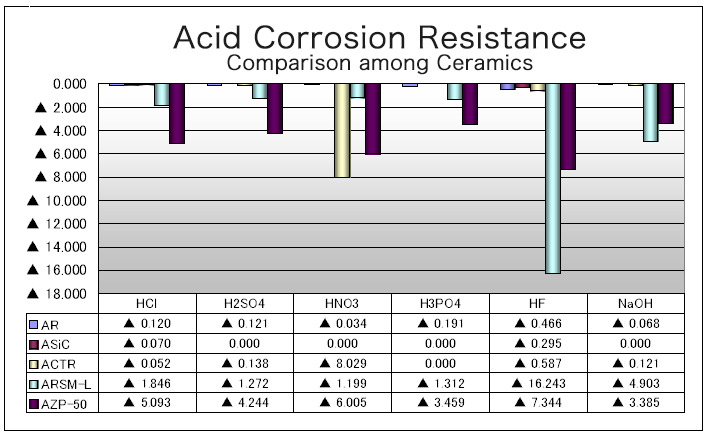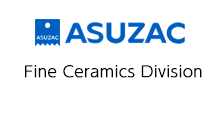Properties of Fine Ceramics
Choose material by property
Ceramics
Mechanical Properties
Hardness (Vickers Hardness)
Used to evaluate the wear resistance of fine ceramics.
The higher the value, the more resistant it is to wear.
Stiffness (Young's Modulus)
Used to evaluate the bending properties of fine ceramics.
The higher the value, the harder the material is to bend or deform.
Fracture Toughness
Used to evaluate how easily fine ceramics can be broken by cracks, the higher the value, the harder it is to break.
Fracture toughness is the degree of how much ceramics can sustain their integrity when pressure is applied to a cracks or defective area.
Bending Strength
Used to evaluate fine ceramics' resistance to bending stress, the higher the value, the harder it is to bend.
Specific Gravity (Density)
Used to evaluate the weight of fine ceramics, the higher the value, the heavier the unit volume is.
Thermal Properties
Thermal Expansion (Linear Expansion Coefficient)
Used to evaluate the degree of fine ceramics' expansion by heat, the higher the value, the more it will expand or shrink due to temperature differences.
Thermal Conductivity
Used to evaluate the fine ceramics' ability to transfer heat, the higher the number, the more heat is transferred.
| Highlow | Value (W/(m・K) ) |
Material Name | Details |
|---|---|---|---|
| 170.0 | SiC | Details | |
| 140.0 | High Purity SiC | Details | |
| 32.0 | Alumina | Details | |
| 31.2 | Black Alumina | Details | |
| 31.0 | High Purity Alumina | Details | |
| 23.0 | Alumina Sheets & Plates | Details | |
| 5.5 | Conductive Corseed | Details | |
| 4.0 | Zirconia | Details | |
| 2.9 | Heat-Insulative Alsima L | Details |
Electric Properties
Semi-Insulative / Semi-Conductive
It is used to evaluate the difficulty of fine ceramics passing through electricity.
The higher the value, the more difficult it is to pass electricity.
| Volume resistivity Highlow |
Value(Ω・cm ) | Material Name | Details |
|---|---|---|---|
| >1015 | Alumina | Details | |
| >1015 | Alumina Sheets & Plates | Details | |
| >1015 | High Purity Alumina | Details | |
| >1014 | Heat-Insulative Alsima L | Details | |
| >1014 | Black Alumina | Details | |
| >1012 | Zirconia | Details | |
| ×108 | High Purity SiC | Details | |
| ×106 | SiC | Details | |
| 1 | Conductive Corseed | Details |
Porous Ceramics
Mechanical Properties
Bending Strength
Used to evaluate fine ceramics' resistance to bending stress, the higher the value, the harder it is to bend.
Thermal Properties
Thermal Expansion (Linear Expansion Coefficient)
Used to evaluate the degree of fine ceramics' expansion by heat, the higher the value, the more it will expand or shrink due to temperature differences.
ASUZAC conducted an acid corrosion resistance test for the following ceramics: Alumina (AR), Silicon Carbide (ASiC), Corseed (ACTR), Alsima L (ARSM-L) and Porous Alumina (AZP-50).
A piece of these ceramics was immersed into sulfuric acid, nitric acid, hydrochloric acid, phosphoric acid, hydrofluoric acid, and sodium hydroxide.
Experimental conditions:
Melting temperature 100℃
Immersion time 24 hours
Specimen size 3 × 4 × 39mm
Solution concentration: 3 mol / l , sulfuric acid 3 mol / l , nitric acid 3 mol / l, hydrochloric acid 3 mol / l , phosphoric acid 3 mol / l , hydrofluoric acid 6 mol / l
(Click each material name to jump to the details page.)
| Materials | Hydrochloric acid | Sulfuric acid | Nitric acid | Phosphoric acid | Hydrofluoric acid | Hydroxylation sodium |
|---|---|---|---|---|---|---|
| Almina (AR) | -0.120 | -0.121 | -0.034 | -0.191 | -0.466 | -0.068 |
| SiC (ASiC) | -0.070 | 0.000 | 0.000 | 0.000 | -0.295 | 0.000 |
| Corseed (ACTR) | -0.052 | -0.138 | -8.029 | 0.000 | -0.587 | -0.121 |
| Alsima L (ARSM-L) | -1.846 | -1.272 | -1.199 | -1.312 | -16.243 | -4.903 |
| Porous Alumina (AZP-50) | -5.093 | -4.244 | -6.005 | -3.459 | -7.344 | -3.385 |

Unit: mg/cm2
Contact Us
Customizable from single quantity orders.
Please feel free to contact us.
-
ASUZAC Inc.
Fine Ceramics DivisionOpening hours:9:00~17:00(Sat, Sun closed)
FAX : +81-26-251-2160





